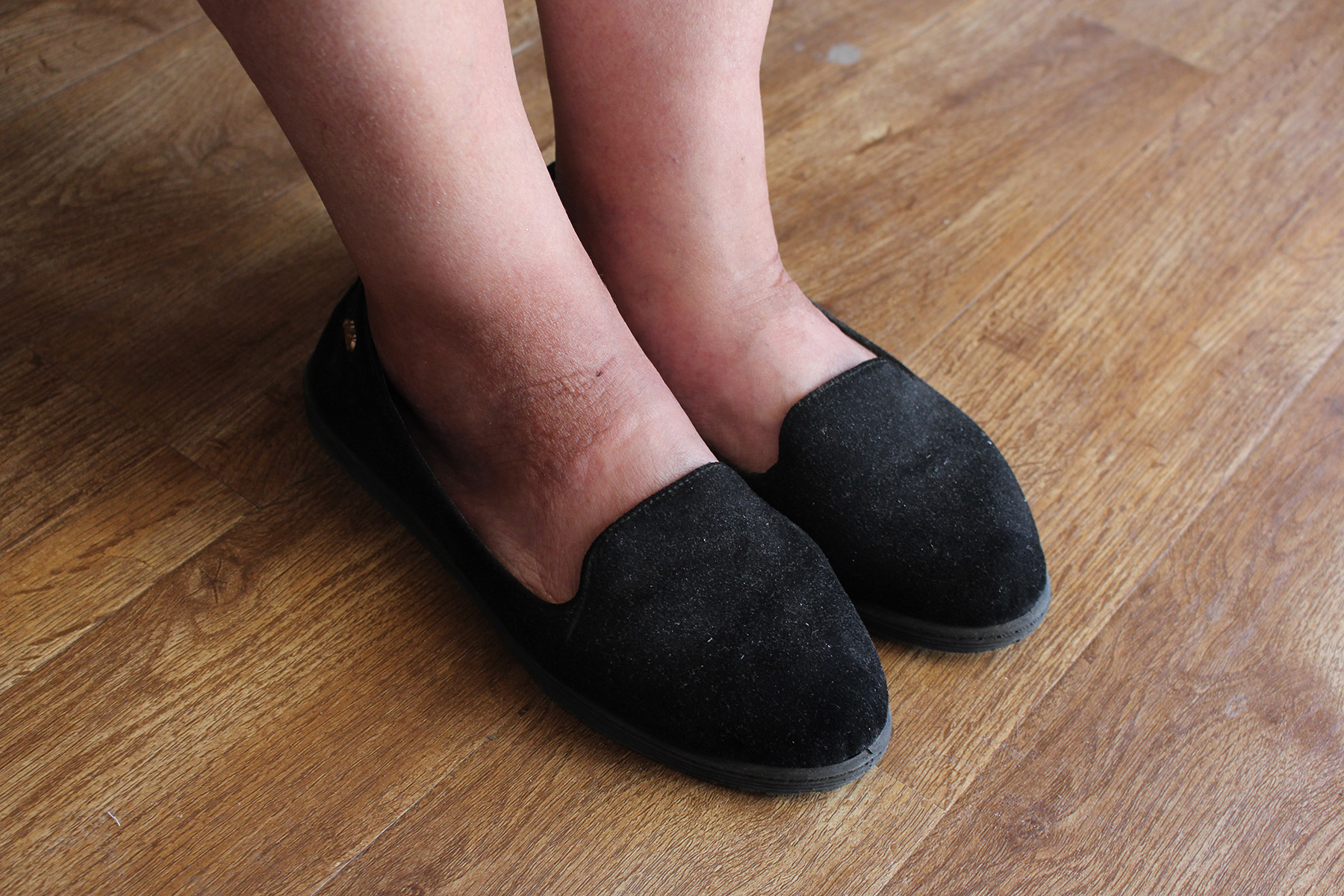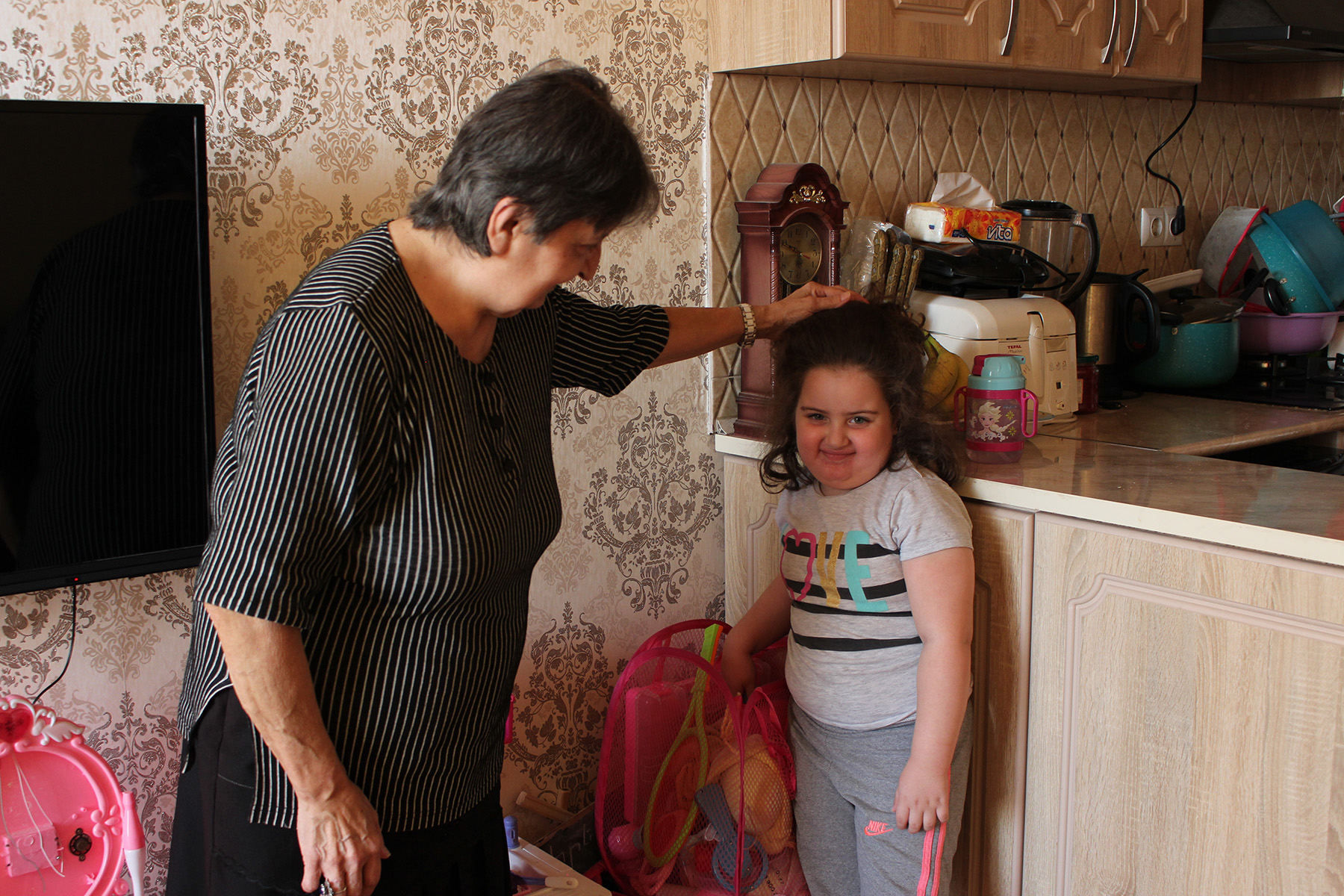
Seventy-three-year-old Shoghik Hekimyan-Godalazian moved to Armenia after a massive explosion in August 2020 ripped through her home in downtown Beirut. But the move, coming just before war broke out in Nagorno-Karabakh, has not been without difficulties.
Shoghik Hekimyan-Godalazian still carries shards of glass in her legs from the 2020 Beirut explosion. She is one of 1,100 Lebanese-Armenians to immigrate to Armenia following the blast. For the months she has lived in the country, she has stayed with her daughter’s family.
A mother to two, Shoghik spent 50 years of her life in Beirut — for many living through the Lebanese civil war. But, she told OC Media the blast on 4 August, one of the largest non-nuclear explosions in history, was like nothing she had ever seen before. When the explosion struck, Shoghik was at her stove in the kitchen. Then, suddenly, all the glass around her shattered — turning into thousands of pieces of shrapnel.
‘The whole sky was thick with black smoke. I couldn’t understand anything. Everyone was in a panic’, Shoghik recalled.
Her legs are injured up to her knees. Though in the moments after the blast, she managed to pick out some of the glass in her legs, many of the shards remain under her skin.

She lost almost all of her documents in the blast, with her passport one of the few things she managed to save. Now, Ani Tarpinian, Shoghik’s daughter, is having difficulties obtaining a residency permit for her mother.
‘I think the government must pay special attention to this issue. My mother is not given residency because of missing documents. But how can we get the documents if everything is lost?’ she told OC Media. ‘In Armenia, they ask for the paper version of documents but those don’t exist.’
The Armenian authorities announced a support programme for Lebanese-Armenians who came to Armenia in the aftermath of the explosion. It was expected to come into force at the end of September. But the war in Nagorno-Karabakh interrupted this.
Under the programme, the rent, utility costs, and tuition fees of Lebanese-Armenian immigrants will be subsidised and they will be exempt from paying local taxes and duties. They will also receive free or subsidised medical treatment, depending on the procedure.
‘The lost documents can be recovered in Lebanon and sent to Armenia. The only thing we can do to help Lebanese-Armenians in this issue is simplify the citizenship and residency procedure. And this has already been ordered by the Prime Minister’, Hovhannes Aleksanyan, Head of the Strategy Development Division of Diaspora High Commissioner’s Office told OC Media in September.
But even if Shoghik receives new documents, with the fate of the aid programme up in the air, she must continue to rely on the much less comprehensive help of non-governmental and international organisations. For the government, the social needs of the thousands of people displaced from Nagorno-Karabakh have taken precedence.
A homecoming and a war
Shoghik’s house was located in a seven-storey building in Mar Mikhael, one of Beirut’s Armenian neighbourhoods. She had lived there alone after the death of her husband.
In the immediate aftermath of the explosion, Shoghik’s daughter frantically made calls from Armenia to find out what happened to her and was told her mother was dead. It was only when her husband arrived at the flat that she discovered that Shoghik had survived.
Shoghik says her house was richly furnished, but it is her books she misses the most. ‘Every time when we talked about leaving Lebanon, I worried about my books. My daughter’s husband promised to bring back any that might have survived’.

Today, the Beirut blast survivors in Armenia are looking for jobs, better living conditions, and security. Most lost their homes in Lebanon and still struggle to set roots in their new homes.
Repat Armenia, a non-governmental organisation supporting repatriates, launched an Employment Support Programme for Lebanese-Armenians in collaboration with The Diaspora High Commissioner’s Office to help them easily integrate into the local job market.
‘One-hundred-and-ten Lebanese-Armenians have applied to our NGO looking for employment opportunities. To help them with this, we created a platform and campaign with over 280 vacancies placed’, Vardan Marashlyan, the Executive Director of Repat Armenia told OC Media in early September.
The group has also designed a health insurance package for Lebanese-Armenians that covers health costs up to ֏7 million ($15,000) for a cost of ֏120,000 ($250).
Another challenge cited by many Lebanese Armenians is adapting to the local language, as they speak Western Armenian, a separate language from the Eastern Armenian spoken by the majority in Armenia.
Big Mind, a training centre in Yerevan, has launched a project called Let’s Speak Eastern Armenian, providing free classes for Lebanese repatriates like Shoghik. A representative of Big Mind told OC Media that since the programme began in early autumn, most of the participants have succeeded in finding jobs.
‘We are planning to launch the second round of the course as soon as the situation in the country stabilises’, Hagop Makdis, the project director told OC Media in November.
For the Shoghik, the challenges of adaptation are a little different. She is a retiree reentering the job market, which is far from easy. Especially as her longest job experience, despite her education as a doctor, has been that of a teacher — teaching Western Armenian.
Shoghik finds it difficult to say what exactly she expects from the Armenian authorities — especially in such difficult circumstances. Her heart goes out to all those who lost their homes and were touched by the war in Nagorno-Karabakh. She knows war only all too well, she said.
Shoghik lost her brother to a bomb that exploded in the first years of the Lebanese Civil War, and she still remembers hearing the bomb-blasts echoing through the city as she rested at home after returning from the hospital to give birth to her eldest daughter.
Nevertheless, she said she still hopes that her having no home of her own and no proper legal status in Armenia will not completely escape the attention of the government. Meanwhile, Aragats and Ara, two of Armenia’s largest mountains, are visible from the balcony of her daughter’s home, and she spends her days gazing at that scene.
Shoghik told OC Media she is happy to be in Armenia, even if she wishes she would have more support. She does not plan to return to Beirut.








